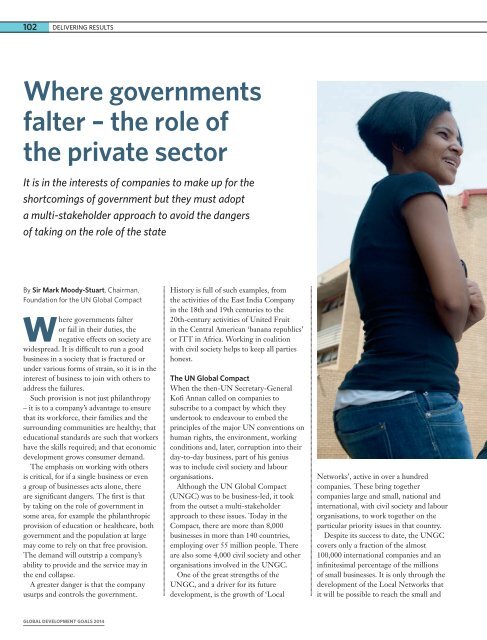FAMBB
FAMBB
FAMBB
You also want an ePaper? Increase the reach of your titles
YUMPU automatically turns print PDFs into web optimized ePapers that Google loves.
102 DELIVERING RESULTSWhere governmentsfalter – the role ofthe private sectorIt is in the interests of companies to make up for theshortcomings of government but they must adopta multi-stakeholder approach to avoid the dangersof taking on the role of the stateBy Sir Mark Moody-Stuart, Chairman,Foundation for the UN Global CompactWhere governments falteror fail in their duties, thenegative effects on society arewidespread. It is difficult to run a goodbusiness in a society that is fractured orunder various forms of strain, so it is in theinterest of business to join with others toaddress the failures.Such provision is not just philanthropy– it is to a company’s advantage to ensurethat its workforce, their families and thesurrounding communities are healthy; thateducational standards are such that workershave the skills required; and that economicdevelopment grows consumer demand.The emphasis on working with othersis critical, for if a single business or evena group of businesses acts alone, thereare significant dangers. The first is thatby taking on the role of government insome area, for example the philanthropicprovision of education or healthcare, bothgovernment and the population at largemay come to rely on that free provision.The demand will outstrip a company’sability to provide and the service may inthe end collapse.A greater danger is that the companyusurps and controls the government.History is full of such examples, fromthe activities of the East India Companyin the 18th and 19th centuries to the20th-century activities of United Fruitin the Central American ‘banana republics’or ITT in Africa. Working in coalitionwith civil society helps to keep all partieshonest.The UN Global CompactWhen the then-UN Secretary-GeneralKofi Annan called on companies tosubscribe to a compact by which theyundertook to endeavour to embed theprinciples of the major UN conventions onhuman rights, the environment, workingconditions and, later, corruption into theirday-to-day business, part of his geniuswas to include civil society and labourorganisations.Although the UN Global Compact(UNGC) was to be business-led, it tookfrom the outset a multi-stakeholderapproach to these issues. Today in theCompact, there are more than 8,000businesses in more than 140 countries,employing over 55 million people. Thereare also some 4,000 civil society and otherorganisations involved in the UNGC.One of the great strengths of theUNGC, and a driver for its futuredevelopment, is the growth of ‘LocalNetworks’, active in over a hundredcompanies. These bring togethercompanies large and small, national andinternational, with civil society and labourorganisations, to work together on theparticular priority issues in that country.Despite its success to date, the UNGCcovers only a fraction of the almost100,000 international companies and aninfinitesimal percentage of the millionsof small businesses. It is only through thedevelopment of the Local Networks thatit will be possible to reach the small andGLOBAL DEVELOPMENT GOALS 2014


